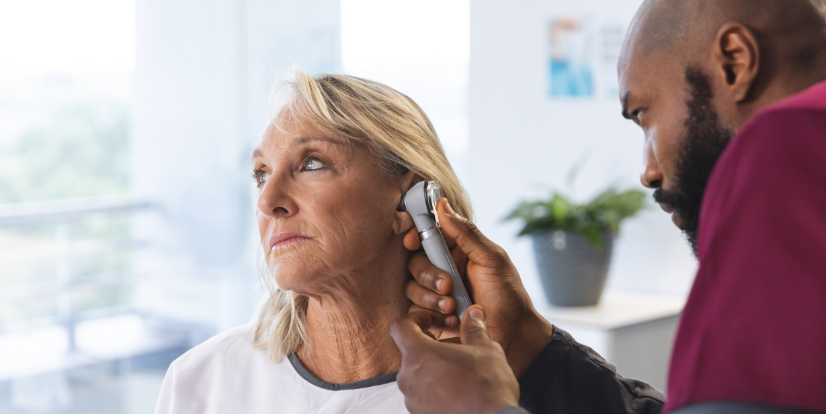Do you feel confused and hear muffled sounds when someone speaks? This could be a sign of hearing loss in one ear.
Hearing is one of our most essential common senses, that connects us to the world around us. However, things may seem to go haywire when this sense of ours fails. Hearing loss in one ear can be a challenging ordeal whether it is sudden hearing loss in one ear or gradual hearing impairment. Typically hearing loss can range from partial to complete silence on one side. Leading a life with muffled sounds or completely absent can be inconvenient, and sometimes can lead to feelings of isolation and confusion.
Understanding the causes of sudden hearing loss in one ear is essential. The causes of hearing loss can vary widely from medical conditions to environmental factors. In this blog, we will try to explore things you need to know about hearing loss in one ear.
What Is One-Sided Hearing Loss?
One-sided hearing loss, or unilateral hearing loss, is a common type of hearing loss that affects only one ear. The inability to hear properly from one ear might leave you feeling off-balance and confused.
Unlike bilateral hearing loss, which affects the hearing ability of both ears equally, one-sided impairment affects only one ear. The loss of hearing from an ear creates unique challenges. Generally, the sounds may appear distorted or localized to the functioning ear, thereby making it difficult to pinpoint where noises are coming from.
What Causes Hearing Loss in One Ear?
It may sound strange but hearing loss is among the top three causes of disability. However sided sensorineural deafness is not that common like bilateral hearing loss. The main causes of hearing loss in one ear include:
- Any abnormality of the inner ear
- Injury on top of the head or the middle part of the skull.
- Disorder of the inner ear
- Any growth on the nerves supplying the inner ear
- Vascular Ischemia ( lack of blood supply to the ear)
- Certain autoimmune disorder
- Infections of the outer and middle ear
- Certain medications like chemotherapy, aspirin
- Idiopathic (without any known causes)
What Are Different Treatment Options for One-Sided Hearing Loss?
Treatment for hearing loss in one ear can depend on the underlying cause of the deafness. The first treatment approach is to see an audiologist or an ENT specialist. Based on the cause of the deafness your doctor will suggest you the best treatment. The different treatment approaches include:
- Hearing aids
Unilateral hearing aids are specifically designed hearing aids to manage unilateral hearing loss. These hearing aids help to improve sound perception so that you are not left lost or confused during a conversation. - Corticosteroids
Corticosteroids may be prescribed to reduce inflammation and restore some degree of hearing. - Surgery
Sometimes unilateral hearing loss can happen due to structural issues. To treat such types of deafness surgical interventions might be necessary. Your doctor will perform surgery to correct abnormalities or remove obstructions that are affecting your auditory function.
Surgery is also a treatment option if your deafness can be cured by stimulating your cochlea. During the surgery, your doctor places bone-anchored implants thereby stimulating the cochlea directly through vibrations transmitted via bone conduction. - Auditory training
Sometimes auditory training can help you interpret sounds better. The auditory training enhances your ability to hear with one ear so that you do not feel lost or confused.
How To Live with One-Sided Hearing Loss?
Living with one-sided hearing loss can be challenging. You might find it difficult to adjust to your daily routines and to accommodate your hearing needs.
You can start by identifying your environment. You can arrange your furniture in a way that promotes better sound direction toward your stronger ear. This small change of placement of furniture can make conversations easier for you to hear without leaving you frustrated.
Additionally, you can also use assistive technology like directional microphones or specialized headphones that can enhance sounds coming from one side. The inclusion of assistive technology can make it easier for you to interact with confidence.
Please do not feel shy to let your friends and family know about your condition. By letting them know your condition you can help them communicate with you efficiently without frosting either of you. Let your friends and family know how they can support you during conversations like let them know that reducing background noise can help you hear better.
Try including meditation and focused breathing exercises in your daily routine. These exercises can help you focus better while reducing your anxiety.
How To Improve Communication and Quality of Life for People with One-Sided Hearing Loss?
Hearing loss should not make you feel lost but you must ensure to establish effective communication. You can enhance conversations and make it more engaging by trying to maintain eye contact while ensuring to position yourself at an optimal angle. This helps with lip reading and visual cues.
Alternatively, you can use assistive devices for better hearing. These devices can help you hear better as these hearing aids are designed for unilateral use to provide better sound quality and directionality.
Also please do not feel shy to talk about your condition with friends and family. By letting them know about your hearing loss you can foster understanding and patience among them during conversation.
Avoid choosing noisy environments, choose quieter venues when possible. Do not feel shy to ask people to repeat what they said.
Conclusion
Living with unilateral hearing loss can be challenging as it not only affects our hearing ability but sometimes even hampers our confidence. While we cannot simply undo the hearing loss by understanding the cause of the hearing loss we can get the best treatment approach. Sometimes a hearing aid can come to your savior, or your doctor might suggest surgery. However, you must understand that there is nothing to be embarrassed about. You must talk to your friends and family so that they can help you communicate with and to them efficiently.
Hearing loss is just a small blocker in your life, do not let it affect your confidence or the quality of your life. But do not consider it a minor issue with proper help and guidance you can sometimes reverse this condition. If it cannot be reversed your doctor will help you manage your one-sided deafness efficiently.
If you or your loved one is experiencing one-sided hearing loss with ringing or without any other associated symptoms and are unable to find a doctor for you, do not worry. Our team at Know You Health can help you find the best doctor for your complaint near you who offers the best healthcare services.






